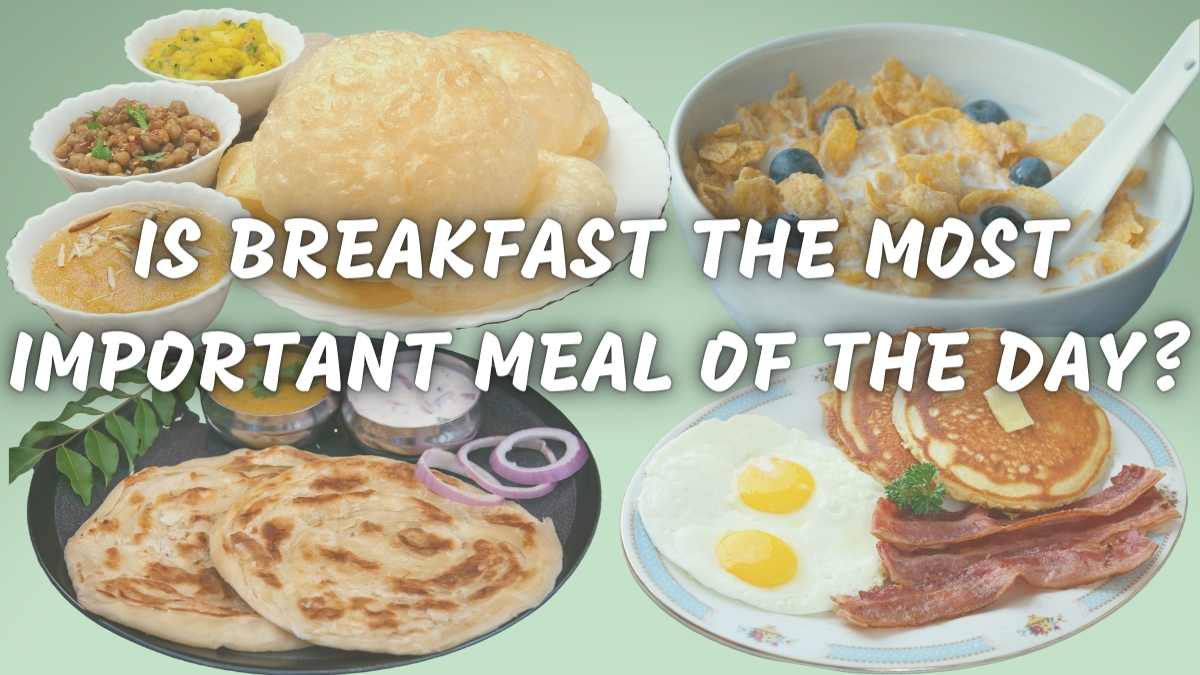
Is Breakfast Really the Most Important Meal of the Day?
Is breakfast really the most important meal of the day? This question has been debated for decades, with proponents touting its benefits for everything from weight loss to brain function. But is the hype justified? We’ll delve into the history of this adage, examine the scientific evidence, and explore the nutritional and practical implications of starting your day with a meal.
From the traditional English breakfast to the light and airy Japanese morning meal, breakfast habits have varied drastically across cultures and throughout history. As we navigate the modern world with its fast-paced lifestyles and dietary trends, it’s crucial to understand the science behind breakfast and its impact on our health and well-being.
Historical Perspective: Is Breakfast Really The Most Important Meal Of The Day

The notion that “breakfast is the most important meal of the day” has become deeply ingrained in our cultural consciousness, but its origins and evolution are intertwined with historical factors like societal norms, food availability, and evolving scientific understanding. While the phrase itself might not have emerged until the late 19th century, the concept of a morning meal has existed for centuries, shaped by various factors.
Early Breakfast Habits
The composition and importance of breakfast varied significantly across different cultures and historical periods. In ancient civilizations, breakfast often reflected the availability of food and the demands of daily life. For example, in ancient Rome, the wealthy might enjoy a luxurious breakfast of bread, cheese, fruits, and honey, while the working class consumed simpler fare like porridge or bread.
In medieval Europe, breakfast was often a light meal consisting of bread, cheese, and beer, reflecting the limited food availability and the importance of conserving energy for labor. During the Renaissance and Enlightenment, the focus on individual health and well-being led to a greater emphasis on a balanced diet, including a more substantial breakfast.
This period saw the rise of cookbooks that included recipes for elaborate breakfasts, often featuring meat, eggs, and pastries.
The Rise of the Modern Breakfast
The Industrial Revolution and the subsequent urbanization brought significant changes to breakfast habits. The emergence of factory work and the need for sustained energy throughout the day led to a shift towards more filling and calorie-rich breakfasts. This period also witnessed the rise of mass-produced breakfast foods, such as cereal and packaged pastries, which offered convenience and affordability.
In the early 20th century, the “breakfast is the most important meal of the day” mantra gained widespread popularity, driven by factors such as:
- The development of nutritional science, which highlighted the importance of starting the day with a balanced meal.
- The marketing efforts of food companies, which promoted the benefits of their products for breakfast consumption.
- The rise of advertising and media, which further reinforced the idea of breakfast as a vital component of a healthy lifestyle.
Notable Breakfast Routines
Throughout history, notable figures have embraced diverse breakfast routines, reflecting their individual preferences and the societal norms of their time. For example,
“Winston Churchill, the British Prime Minister during World War II, was known for his hearty breakfast of bacon, eggs, and toast, a meal that provided him with the energy he needed to lead the nation through a challenging period.”
“Queen Victoria, on the other hand, preferred a lighter breakfast of tea, toast, and fruit, a reflection of the Victorian era’s emphasis on refinement and moderation.”
These examples highlight the variability in breakfast habits, even among prominent figures, and demonstrate how breakfast has served as a reflection of both individual preferences and broader societal trends.
Scientific Evidence

The scientific community has conducted numerous studies to investigate the impact of breakfast on various aspects of health. While the “most important meal” notion has been challenged, research provides valuable insights into the potential benefits and drawbacks of breakfast consumption.
Impact on Metabolism
Studies suggest that breakfast consumption may positively influence metabolic processes. For example, a study published in the American Journal of Clinical Nutrition found that individuals who ate breakfast had a higher metabolic rate throughout the day compared to those who skipped breakfast.
This may be due to the fact that breakfast helps to regulate blood sugar levels, preventing spikes and crashes that can lead to increased insulin resistance. However, it’s important to note that the impact of breakfast on metabolism can vary depending on the composition of the meal.
Consuming a breakfast high in refined carbohydrates may lead to a rapid rise in blood sugar, potentially negating any metabolic benefits.
Cognitive Function
Research has explored the relationship between breakfast consumption and cognitive function, particularly in children and adolescents. Several studies have shown that eating breakfast can improve attention, memory, and academic performance. For example, a study published in the journal Pediatrics found that children who ate breakfast regularly scored higher on standardized tests compared to those who skipped breakfast.
This may be attributed to the fact that breakfast provides the brain with essential nutrients, such as glucose, which is required for optimal cognitive function. However, further research is needed to determine the long-term effects of breakfast consumption on cognitive function.
Weight Management, Is breakfast really the most important meal of the day
The role of breakfast in weight management remains a subject of debate. Some studies have suggested that breakfast consumption may promote weight loss or weight maintenance. For instance, a review of 13 studies published in the journal Obesity Reviews found that breakfast eaters tended to have lower body mass indexes (BMIs) compared to those who skipped breakfast.
However, other studies have found no significant association between breakfast consumption and weight. It’s important to consider that the impact of breakfast on weight may depend on the individual’s overall dietary intake and physical activity levels.
So, is breakfast really the most important meal of the day? It’s a question that’s been debated for years, and the answer might depend on your individual goals and lifestyle. One thing’s for sure, tracking your food intake and analyzing the data can be a powerful tool to understand how your diet impacts your energy levels and overall well-being.
Check out these 3 ways to use tracked data to meet your goals , and you might be surprised at what you learn about your own breakfast habits. Whether you’re a breakfast fanatic or a skip-it-and-run kind of person, understanding your body’s response to food is key to making informed decisions about your nutrition.
Physiological Impact
Breakfast plays a crucial role in regulating our body’s functions, particularly in the early hours after waking up. It provides essential nutrients and energy, influencing our blood sugar levels, hormone production, and overall well-being throughout the day.
Blood Sugar Regulation and Energy Provision
Consuming breakfast helps stabilize blood sugar levels after an overnight fast. This is essential because our bodies need a steady supply of glucose for energy, especially for brain function and physical activity. Breakfast provides a quick source of glucose, preventing energy crashes and promoting cognitive function throughout the morning.
A balanced breakfast, including complex carbohydrates, protein, and healthy fats, can help maintain stable blood sugar levels for an extended period, preventing the sugar spikes and dips associated with skipping breakfast.
Hormone Production and Satiety
Breakfast can influence the production of hormones that regulate hunger and satiety. Eating a nutritious breakfast can help stimulate the release of leptin, a hormone that signals fullness and reduces appetite. Conversely, skipping breakfast can lead to increased levels of ghrelin, the hunger hormone, which can trigger cravings and overeating later in the day.
Impact of Skipping Breakfast
Skipping breakfast can have various physiological impacts, both positive and negative. Here’s a table summarizing some potential effects:| Effect | Skipping Breakfast | Eating Breakfast ||—|—|—|| Weight Loss | May initially lead to weight loss due to reduced calorie intake, but can lead to overeating later in the day and hinder long-term weight management.
| Can contribute to weight management by promoting satiety and reducing overall calorie intake throughout the day. || Cognitive Performance | May impair cognitive function, leading to reduced focus, concentration, and memory. | Can improve cognitive performance, enhancing focus, alertness, and memory.
|| Energy Levels | May lead to fatigue, low energy, and difficulty concentrating. | Can provide sustained energy levels, reducing fatigue and promoting alertness. |
Nutritional Considerations
A balanced breakfast provides the body with essential nutrients to kickstart the day and fuel cognitive function, physical activity, and overall health. It’s not just about the “most important” meal, but rather about making smart choices that contribute to a healthy diet.
Key Nutrients for a Healthy Breakfast
A well-rounded breakfast should include a variety of nutrients to provide sustained energy and support overall well-being. Here’s a breakdown of essential nutrients and their food sources:
| Nutrient | Food Sources |
|---|---|
| Carbohydrates | Whole-grain cereals, oatmeal, toast, fruit, yogurt |
| Protein | Eggs, yogurt, milk, nuts, seeds, beans |
| Healthy Fats | Avocado, nuts, seeds, olive oil |
| Fiber | Whole grains, fruits, vegetables, legumes |
| Vitamins and Minerals | Fruits, vegetables, dairy products, fortified cereals |
Nutritional Comparison of Breakfast Options
Different breakfast choices offer varying nutritional profiles. Let’s compare some popular options:
Cereal
Cereal can be a convenient and quick breakfast option, but it’s essential to choose varieties that are low in sugar and high in fiber. Whole-grain cereals are generally a better choice than sugary cereals.
We’ve all heard the saying, “Breakfast is the most important meal of the day,” but does it really hold true? For those following a Mediterranean diet, which is known for its abundance of whole grains and fruits, making it low-carb friendly might seem like a challenge.
However, there are plenty of delicious and effective ways to adapt the diet, such as focusing on lean protein and healthy fats. Check out these tips for making the Mediterranean diet low-carb friendly , and you might find that skipping breakfast altogether is a perfectly healthy option for you!
Yogurt
Yogurt is a good source of protein and calcium, especially Greek yogurt, which is higher in protein. However, flavored yogurts can be high in sugar. Opt for plain yogurt and add your own fruit or a drizzle of honey for sweetness.
Eggs
Eggs are a complete protein source, meaning they contain all the essential amino acids. They are also rich in vitamins and minerals, including choline, which is important for brain health.
We’ve all heard the saying, “Breakfast is the most important meal of the day,” but is it really? It’s easy to get caught up in the hype and fall into thinking traps that can actually sabotage your weight loss goals.
It’s important to be mindful of thinking traps to avoid when trying to lose weight , like the “all-or-nothing” mentality or focusing solely on calories without considering nutrient density. Ultimately, the most important meal is the one that fits your individual needs and helps you achieve your goals, whether that’s a balanced breakfast or a nutritious dinner.
Fruit
Fruit is a great source of vitamins, minerals, and fiber. It can be enjoyed on its own or added to yogurt, cereal, or oatmeal.
Individual Dietary Needs and Preferences
Ultimately, the best breakfast for you will depend on your individual dietary needs, preferences, and lifestyle.
“It’s crucial to consider factors such as allergies, intolerances, and dietary restrictions when making breakfast choices.”
For example, someone with diabetes may need to choose a breakfast low in carbohydrates and high in protein. A vegetarian might prioritize plant-based protein sources like tofu or beans.It’s important to listen to your body and choose breakfast options that make you feel energized and satisfied.
Experiment with different foods and find a breakfast routine that works best for you.
Practical Implications
While the benefits of breakfast are undeniable, fitting a healthy morning meal into a busy schedule can be challenging. This section explores practical strategies and delicious recipes to make breakfast a regular part of your day, even with limited time.
Tips and Strategies for Incorporating a Healthy Breakfast
A healthy breakfast doesn’t have to be complicated or time-consuming. Here are some tips and strategies to make it a routine, even with a busy lifestyle:
- Prepare Ahead:Weekend meal prepping can save time during the week. Prepare overnight oats, hard-boiled eggs, or cut up fruits and vegetables to grab and go in the morning.
- Simplify Your Routine:Choose easy-to-prepare options like yogurt with fruit and granola, toast with avocado, or a smoothie.
- Eat on the Go:If you’re short on time, pack a portable breakfast like a protein bar, fruit, or nuts.
- Make it a Habit:Consistency is key. Try to eat breakfast at the same time each day, even if it’s just a small snack.
Quick and Easy Breakfast Recipes
Here are some nutritious and appealing breakfast recipes that are quick and easy to prepare:
- Overnight Oats:Combine rolled oats, milk (dairy or non-dairy), chia seeds, and your favorite fruits and nuts in a jar. Refrigerate overnight and enjoy in the morning.
- Smoothie:Blend together yogurt, fruit, spinach, and protein powder for a quick and nutritious breakfast.
- Avocado Toast:Top whole-grain toast with mashed avocado, a sprinkle of salt and pepper, and a squeeze of lemon juice.
- Breakfast Burrito:Scramble eggs with vegetables and cheese, wrap in a whole-wheat tortilla, and enjoy on the go.
Breakfast’s Role in Promoting Healthy Eating Habits
A healthy breakfast sets the tone for the rest of the day, promoting healthy eating habits and overall well-being:
- Improved Blood Sugar Control:Breakfast helps stabilize blood sugar levels, preventing energy crashes and cravings throughout the day.
- Increased Satiety:Eating a balanced breakfast can help you feel fuller for longer, reducing the likelihood of overeating later in the day.
- Better Nutrient Intake:Breakfast provides essential nutrients like vitamins, minerals, and fiber that are crucial for optimal health.
- Enhanced Cognitive Function:Studies have shown that breakfast can improve concentration, memory, and overall cognitive performance.
Cultural Variations

Breakfast traditions and preferences are deeply rooted in culture, history, and geography, showcasing a fascinating diversity in how people around the world start their day. From savory to sweet, simple to elaborate, breakfast meals reflect local ingredients, culinary practices, and social customs.
Global Breakfast Diversity
The world’s breakfast table is a vibrant tapestry of flavors and traditions. Here are some examples of unique breakfast dishes from different cultures:
- Japan:A traditional Japanese breakfast often includes miso soup, rice, grilled fish (such as salmon or mackerel), pickled vegetables, and a small serving of tofu.
- India:Idli and dosa, savory steamed rice cakes and fermented rice and lentil crepes, are popular breakfast choices in South India.
- Mexico:Chilaquiles, a dish of fried tortilla chips simmered in a red or green salsa and topped with eggs, cheese, and crema, is a hearty and flavorful Mexican breakfast option.
- France:The French often start their day with a simple yet elegant breakfast of croissants, pain au chocolat, coffee, and orange juice.
- United States:American breakfasts are known for their variety, ranging from classic pancakes and waffles to egg-centric dishes like omelets and scrambled eggs.
Breakfast Habits Around the World
A table comparing typical breakfast foods and eating habits of different cultures:
| Culture | Typical Breakfast Foods | Eating Habits |
|---|---|---|
| Japan | Miso soup, rice, grilled fish, pickled vegetables, tofu | Typically eaten at home, often with family |
| India | Idli and dosa, parathas, poha, upma | Often eaten on the go, with a focus on light and easily digestible foods |
| Mexico | Chilaquiles, huevos rancheros, tamales | Typically eaten at home or at local cafes, with a focus on hearty and flavorful dishes |
| France | Croissants, pain au chocolat, coffee, orange juice | Often eaten at home, with a focus on quality and simplicity |
| United States | Pancakes, waffles, omelets, scrambled eggs, cereal, toast | Often eaten on the go or at home, with a focus on convenience and variety |
Individualized Approach
The notion that breakfast is the most important meal of the day is often presented as a universal truth. However, a more nuanced and personalized approach is crucial for optimizing individual health and well-being. Recognizing that everyone is unique, with varying needs, preferences, and lifestyles, it’s essential to consider individual factors when determining the role of breakfast in a healthy diet.
Factors Influencing Breakfast Importance
Individual factors can significantly influence the importance of breakfast for a person’s health and well-being.
- Age:Children and adolescents require a nutrient-rich breakfast to fuel their growth and development. Adults, particularly those who are active, may also benefit from a balanced breakfast to provide sustained energy throughout the day. However, as individuals age, their caloric needs may decrease, and they might find that skipping breakfast doesn’t significantly impact their energy levels.
- Activity Level:People with physically demanding jobs or who engage in regular exercise often require a more substantial breakfast to replenish energy stores and support muscle recovery. Conversely, individuals with sedentary lifestyles may not experience the same benefits from eating breakfast.
- Health Conditions:Certain health conditions, such as diabetes, can benefit from a consistent breakfast routine to regulate blood sugar levels. Individuals with gastrointestinal issues may need to adjust their breakfast choices to minimize discomfort.
Tailoring Breakfast Choices
Once you understand the factors that influence your individual needs, you can tailor your breakfast choices to achieve specific dietary goals.
- Weight Management:For those aiming to lose or maintain weight, a balanced breakfast that includes protein, fiber, and healthy fats can help regulate appetite and promote satiety, leading to reduced calorie intake throughout the day.
- Disease Prevention:Incorporating fruits, vegetables, and whole grains into breakfast can provide essential vitamins, minerals, and antioxidants, which may contribute to reducing the risk of chronic diseases such as heart disease, type 2 diabetes, and certain cancers.
- Improved Mood and Cognitive Function:Consuming a breakfast rich in complex carbohydrates and protein can help stabilize blood sugar levels, leading to improved mood, focus, and cognitive function throughout the morning.
Wrap-Up
Ultimately, whether or not breakfast is “the most important meal of the day” is a personal decision. While there are clear benefits to starting your day with a nutritious meal, the ideal breakfast routine varies depending on individual needs, preferences, and lifestyle.
By understanding the science and exploring different options, you can make an informed choice that supports your overall health and well-being.






